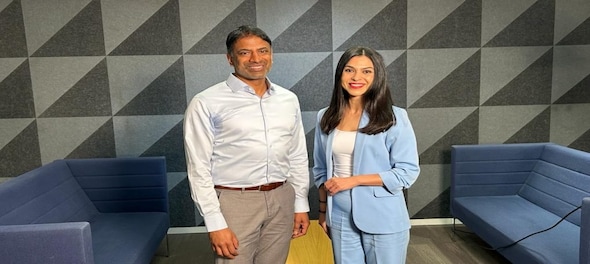
Novartis CEO Vasant ‘Vas’ Narasimhan spoke about the intersection of cutting-edge science and the transformative potential of generative AI in pharmaceutical research in an exclusive interview with CNBC-TV18 — held at the company's corporate centre in Hyderabad, on Thursday, March 21.
On AI and the human body, Narasimhan said, "We only understand 5-10% of what's happening in the 40 trillion cells that are in you and me. Could AI help us understand that more quickly, and then (help us) when we try to design a drug to impact one of those processes in the body? Could we design the drug even better with AI?"
Narasimhan said these are the questions Novartis is trying to answer in partnership with Isomorphic Labs, the drug discovery-focused spinout of Google's DeepMind with which Novartis signed a $1.57-billion deal earlier this year. In 2021, the healthcare major also signed an agreement with Microsoft Research Labs to "leverage data and AI to transform how medicines are discovered, developed and commercialised.”
Narasimhan elaborated on these collaborative efforts underway to harness the power of AI in drug discovery and development, while sounding a note of caution against buying into the ongoing "hype cycle" of AI.
"Can we make fundamental discoveries more quickly (with AI), and then translate them into medicines and hopefully get through the clinic at a higher rate than what we currently see? The truth is that we won't know for 7-10 years ... it's much, much farther away than the hype cycle would tell you. Simply because we want to find something, we won't know until it gets to phase two, three clinical trials," he remarked.
On the potential of AI to streamline the drug development processes, he was cautious, saying. "I think it will help us. I'm not yet convinced it will lead to a complete breakthrough, at least not in its current form.”
Despite acknowledging the transformative potential of AI, Narasimhan urged a measured approach, stating one shouldn't expect results for at least a decade if not more.
"I think we should be measured and humble as to how this will actually unfold. I think it will help us. I'm not yet convinced it will lead to a complete breakthrough, at least not in its current form. Now, the question is, over time, if we invest in, when we teach these systems how to understand biology, 10 years from now, 15 years now, could it change things? Absolutely."
Narasimhan's insights highlighted the delicate balance between optimism and realism in leveraging technology, especially in the critical areas of advancing drug discovery and development that could affect many lives.
Also read: EXCLUSIVE | Novartis global CEO says he wants a better owner for its listed entity in India



